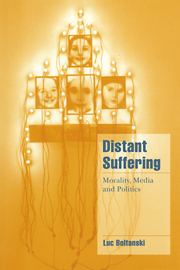8 - Heroes and the accursed
Published online by Cambridge University Press: 22 September 2009
Summary
Aesthetics and politics
To what extent does the aesthetic topic lend itself to political use? While the topics of denunciation and sentiment are orientated towards collective action, the former by making speech an instrument of mobilisation against those responsible for misfortune, the latter by making it a means for bringing together men of good will for beneficent assistance, and are thereby open to political investments, the aesthetic topic seems to renounce action and seems only to inspire a purely individual relationship to distant suffering. Besides, is it not mistaken to associate with a politics of pity with an attitude whose salient features are precisely not to be interested in politics and to reject pity? We will argue that the aesthetic topic was politicised in essentially two ways which, while being at the opposite poles of the political Right and Left, have enough in common to support swings from one to the other and to justify a connection in spite of their antagonisms and polemics.
We have seen that the novelty of an aesthetic view of the world is due to the possibility it offers, by the very fact of it not being political, of allowing a space for radical difference outside political constructions directed towards an egalitarian conception of the social bond.
- Type
- Chapter
- Information
- Distant SufferingMorality, Media and Politics, pp. 131 - 146Publisher: Cambridge University PressPrint publication year: 1999



